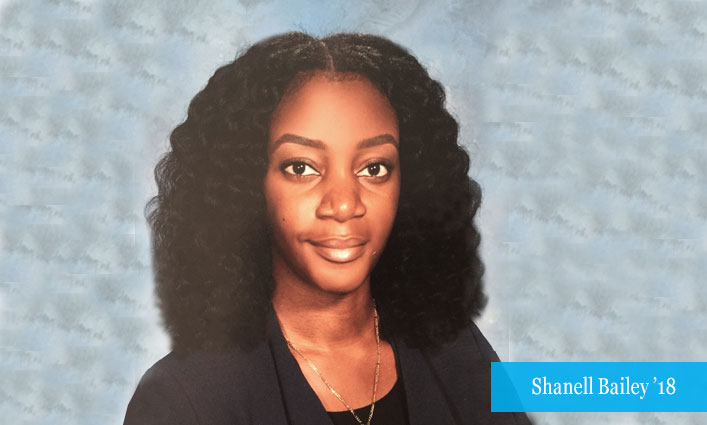
Fulbright Recipient and John Jay Alumna Shanell D. Bailey ’18 Plans to Examine Jamaica’s Prison-to-College Pipeline
As a winner of the 2020 Fulbright U.S. Student Program Fellowship, John Jay alumna Shanell D. Bailey ’18 will head to the University of the West Indies at Mona, in Jamaica, to follow the development of the university’s Prison-to-College Pipeline Program and examine its impact on the social and economic mobility of those leaving the prison system. “I’m focused on the reentry and reintegration of system-impacted individuals because they are some of the most marginalized people in our society,” says Bailey. “As a woman of color born in Kingston, Jamaica and raised in the Bronx, New York, I have been exposed to my share of inequality and marginalization through the years.” Bailey is hoping that her yearlong research will help shed light on how education can uplift individuals reentering society and break the stigma of being system-impacted. “Higher education has always been touted as a gateway to success for society’s most marginalized and vulnerable communities, leading to greater opportunities to overcome social stigmas, find work, and increase earning potential. But can it reduce the stigma of incarceration and improve the quality of life for system-impacted people once they return home? That’s what I’m hoping this project reveals.”
“Higher education has always been touted as a gateway to success for society’s most marginalized and vulnerable communities, leading to greater opportunities to overcome social stigmas, find work, and increase earning potential.” —Shanell Bailey
Believing in Education
Bailey’s steadfast belief in the power of education stems from her own personal experiences and watching how earning a degree enabled her mother to move the family up the social and economic ladder. “My family immigrated to the U.S. when I was three years old. My brother and I were the first in our family to go through the U.S. education system. So, from a young age, education has always been pushed as a gateway to success,” recalls Bailey. “My mother always made sure that we were well-rounded and educated; and she led by example. She earned her bachelor’s degree in Criminal Justice the same year I graduated from high school—making her the first in our family to get a college degree.”
“Correctional institutions across the globe are plagued with similar stories of disenfranchisement, social exclusion, and hopelessness.” —Shanell Bailey
Understanding Reintegration
At John Jay, where Bailey graduated with a bachelor’s degree in Forensic Psychology, she took part in a study abroad experience in South Africa, working with Professor Baz Dreisinger, Ph.D., Founding Academic Director of John Jay’s Prison-to-College Pipeline Program, which offers higher-education courses and reentry resources to residents at the Otisville Correctional facility. “The study abroad trip to South Africa was the start of my journey in reentry and reintegration,” says Bailey. “I was already contemplating working within corrections at the time. And this trip, and the experience of going to the correctional facilities and engaging with the inmates, confirmed for me that I was on the right path.” Visiting the Drakenstein Correctional Centre in South Africa, famous for being the final site of Nelson Mandela’s 27-year imprisonment, proved to be a profound experience for Bailey. “It was there that I understood what Nelson Mandela meant when he said, ‘No one truly knows a nation until you have been inside its jails. A nation should not be judged by how it treats its highest citizens, but its lowest ones,’” she says. “Correctional institutions across the globe are plagued with similar stories of disenfranchisement, social exclusion, and hopelessness. Instead of ignoring these issues, we must work to understand them, tap into those system-impacted individuals’ experiences, and reform the system.”
Soon after returning from that trip, Bailey was filled with determination to help reform the system. She began working as a Research Assistant for the Incarceration Nations Network (INN), again alongside Dreisinger, the network’s Founder and Executive Director. INN, a global network that supports, explores, and promotes innovative prison reform efforts, is helping to reduce recidivism and build safer and more just communities. “My experience in South Africa and with the Incarceration Nations Network has been extremely fulfilling and has helped shape my future. I wouldn’t have realized this calling without Dr. Dreisinger, and I can’t thank her enough for being supportive of my dreams.”
“I believe injustice in all systems cannot be eradicated without establishing a global culture of inclusion that promotes empathy and understanding of all people.”—Shanell Bailey
Researching the Impact of Reentry
Bailey’s Fulbright research project, titled “The Power of Education: Examining the Prison-to-College Pipeline in Jamaica” will enable her to follow the growth and impact of the University of the West Indies at Mona’s new Prison-to-College Pipeline program, which is modeled after John Jay’s successful Prison-to-College Pipeline program. “The goal is to reduce recidivism, decrease the social stigma regarding system-impacted people, and increase their earning potential. To do that, we need effective programs, tools, and practices in place to enable successful reentry and reintegration,” says Bailey. Beyond examining how a university-level prison education program can impact the social and economic mobility of system-impacted individuals, she’s also hoping to explore the kinds of opportunities system-impacted people receive to overcome social exclusion. “I believe injustice in all systems cannot be eradicated without establishing a global culture of inclusion that promotes empathy and understanding of all people,” she says. “My ultimate goal is to uncover ways to improve intergroup relations and effectively integrate socially excluded members of society, like system-impacted individuals. We are more alike than we are different. But in order to realize that and create real change, we have to communicate and engage with each other in productive ways.”



